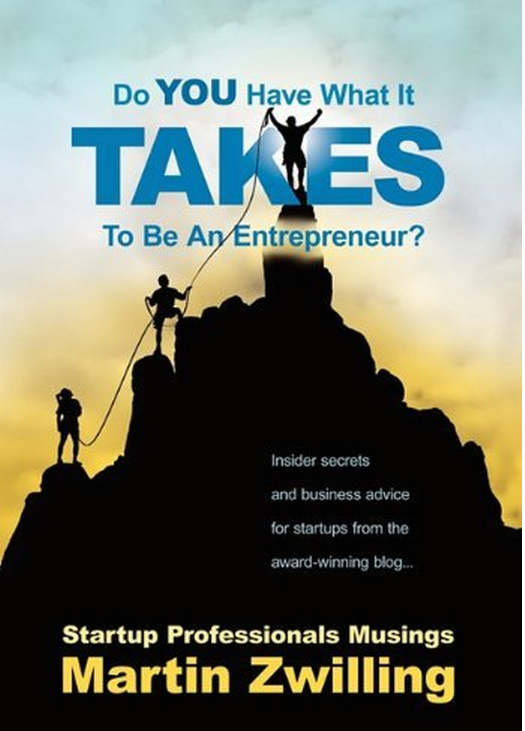 Once you discover it, it’s very difficult to stop reading his blog, full incisive ideas that go straight to the point and useful tips. It combines extraordinary communication skills with extensive experience, an experience usually transmitted to world’s leading media (Forbes, Inc, Harvard Business School …), attained through his work with entrepreneurs. We are talking about Martin Zwilling.
Once you discover it, it’s very difficult to stop reading his blog, full incisive ideas that go straight to the point and useful tips. It combines extraordinary communication skills with extensive experience, an experience usually transmitted to world’s leading media (Forbes, Inc, Harvard Business School …), attained through his work with entrepreneurs. We are talking about Martin Zwilling.
His Forbes profile: ‘Martin is the Founder and CEO of Startup Professionals, a company that provides services to startup founders around the world. His background includes a 30-year track record as an executive in general management, computer software development, product management, and marketing. He is now in «give-back mode» as a mentor to startup founders, and an Angel investor. His experience with investors includes roles on the selection committee of two local Angel groups, and working from the other side of the table with several VCs in Silicon Valley’
In addition to blogging, he has recently released his first book, titled “Do You Have What It Takes To Be An Entrepreneur?”. The book is an addictive collection of reflections you can’t stop reading. We highly recommend it as an essential must-read book for every entrepreneur.
:: How would you define an entrepreneur?
I like to think of an entrepreneur as an innovator – one who creates a business enterprise when he recognizes an opportunity to introduce a new product, a new process or an improved organization, and who raises the necessary money, assembles the factors for production and organizes an operation to exploit the opportunity. An entrepreneur is an innovator who can execute.
:: Are entrepreneurs born or made?
I concede that natural born entrepreneur components do exist, but more often I tend to agree with Peter Drucker, who said “It’s not magic, it’s not mysterious, and it has nothing to do with genes. It’s a discipline, and like any discipline, it can be learned.” On the natural born side, some entrepreneurs seem to have a strong vision and the ability to inspirationally lead others. It is this vision that is the beacon to drive the right people behavior, leading to the success of the business. If you don’t feel a vision in your heart, or if you don’t have the strength to inspire people, entrepreneurship is probably the wrong road for you.
:: Is it a good idea for an entrepreneur to aim exclusively at making money? Why?
An entrepreneur needs to aim at something that is deeply satisfying and fun for him/her. To some that may be making money alone, but to most of us it has to embody doing good or changing the world, as well as making money. An entrepreneur’s key focus should be on helping his customers first (solution), non on helping himself first (making money).
:: Imagine a young person with no experience who wants to try a new idea. Which tools should his ‘entrepreneur’s toolkit’ contain?
All of the above tools are required. An entrepreneur has to be a generalist, not a specialist.
: : Why does an important part of businesses still ignore SocialMedia? Are the opportunities not so clear?
: Why does an important part of businesses still ignore SocialMedia? Are the opportunities not so clear?
Social Media represents a great culture change in business. Many business people are slow to adapt to culture changes. Plus opportunities in Social Media are harder to quantify. Everyone is still separating the hype from the reality.
:: You recommend to start writing a business blog or a Website. Why?
In the new culture, people buy from people, not from companies (unless it’s a recognized brand). Your blog and your website communicate who you are, why you can help, and give you a real persona that your customers can relate too. Too many impersonal startups have turned out to be scams, so potential customers want build a pseudo-personal relationship first.
:: How would you summarize the key elements of a business strategy?
- Nail the pain. Great businesses begin with a customer problem that has a big and monetizable pain point. Avoid the three big mistakes, of guessing but not testing the pain (on real customers), selecting a low customer pain (solution is only nice to have), or selecting a narrow customer pain (small number of customers willing or able to pay).
- Nail the solution. Neither breakthrough technology nor maximum features will assure that “if we build it, they will come.” Start with the minimum focused set of features and technology that will drive a customer purchase. Success demands testing the solution early and quickly in the market, then iterating to get it right.
- Nail the go-to-market strategy. In parallel with nailing the solution, you need an in-depth understanding of your target customer’s buying process, the job they are trying to get done, the market infrastructure, and a stable of serious pilot customers. Do real tests with real pricing to see if customers will pay you, without being pushed.
- Nail the business model. Leverage your customer conversations to predict and validate your business model. For example, when you think about distribution channels, revenue streams, or the relationship with the customer, ask customers what they expect. Don’t forget a viable financial model of costs, margins, customer acquisition, and break-even.
- Scale it. Don’t attempt to scale it until you have a proven repeatable business model that predictably generates revenue. Only then is it time to focus on the get-big-fast strategy, and the transformation of three key areas from startup to a managed growth company. These areas include market, process, and team transitions.
:: “Grand vision without losing the Micro Focus». What do exactly mean?
You have to dream big, but your startup needs a laser focus in the beginning to get market and investor attention. Google did it with search engines, Apple did it with a personal computer, and even Wal-Mart did it through low prices. A business plan I saw a while back to combine all the good features of several popular social networks on one site does not do it. Trying to do everything at once probably means that none of the items will be done well. Plus it’s almost impossible to craft a message that will make your offering stand out in the minds of customers. I can’t think of a company that launched to superstardom with a broad focus.
:: Which are the keys to attract and retain talent in a project that begins with almost no money?
Leadership, vision, and trust.
:: Is there an ideal time to try to go to a round of financing?
The ideal time to ask for funding is after you have a proven product, some customers, and revenue. Investors like to help you scale your business, but an unproven business model is too risky for most investors.
:: Which is the most important thing an entrepreneur must consider before starting negotiations with an investor?
Why is your deal a good opportunity for the investor? Most entrepreneurs can talk for hours about why their solution is good for the customer, but that doesn’t translate automatically to good for the investor. For example, “free” is a dirty word for investors. They want to hear profit, volume, margin, growth, competition knockoffs, exit strategy. None of these would ever be mentioned to a customer.
:: Could you please expand on your following assertion? “The economy is a poor predictor of startup success”
When the economy is down, customers are looking hard for new and better solutions. When the economy is up, customers are looking to spend more money. So startups can and should capitalize on both ends of the spectrum. Historically, many of the most successful companies started during hard times. Success is more a function of capitalizing on new opportunities than riding the waves of the economy.
:: You have direct contact with entrepreneurs –enthusiastic persons who tend to think they have discovered “the new wheel”. Which points are most important for you when you hear or analyze new ideas? Is the business plan important?
I tell entrepreneurs that ideas have no inherent value. Investors look first at the person (can he do what he says, has he done it before?), secondly at the business plan (no plan means no value, so the business plan is very important), and somewhere down the road I look at the idea, in terms of opportunity, viability, scalability, competition, etc. Everyone believes they have a million dollar idea, but I haven’t seen anyone who has collected.
:: In Spain, we have a cultural problem of risk aversion. We fear failure above all. What does Spain need to do to build an entrepreneurship ecosystem and to fight that cultural fear?
As I said earlier, changing a culture is hard. I don’t have any magic. To me, the way to eliminate fear is to eliminate the negative consequences of failure. For example, I know many investors prefer entrepreneurs who have failed at least once, since they probably won’t burn the investment making the same mistake again. That makes the consequence of failure a positive, rather than a negative.
:: At the same time, in Spain we are speaking more and more about entrepreneurship. In fact, it now seems like an “entrepreneur bubble”, it seems to be the solution for every problem. Everything seems so easy! Which part of the story is not being told here?
Entrepreneurship is the solution for most problems, but it does involve a high risk. Don’t be so risk averse. 🙂
:: Which is the best part of your job at Startup Professionals, Inc.? Which is its hardest difficulty?
The best part is mentoring new entrepreneurs who listen, work hard, and execute with success, and teach me things at the same time. I love the learning process. I don’t like to see people fail, especially if it looks like I could have prevented it if I had been more convincing or more knowledgeable.
:: A simple curiosity to end this interview: how do you manage to write almost every other day? How do you inspire and discipline yourself?
I get my inspiration from seeing entrepreneurs succeed, as I mentioned before. Writing is my way of passing on what I see and what I have learned, for “give back” purposes, so it’s easy for me. The discipline to do that is no different than the discipline entrepreneurs have to practice every day to build their company. I’ve been there and done that, and had fun doing it. I’m still having fun.

